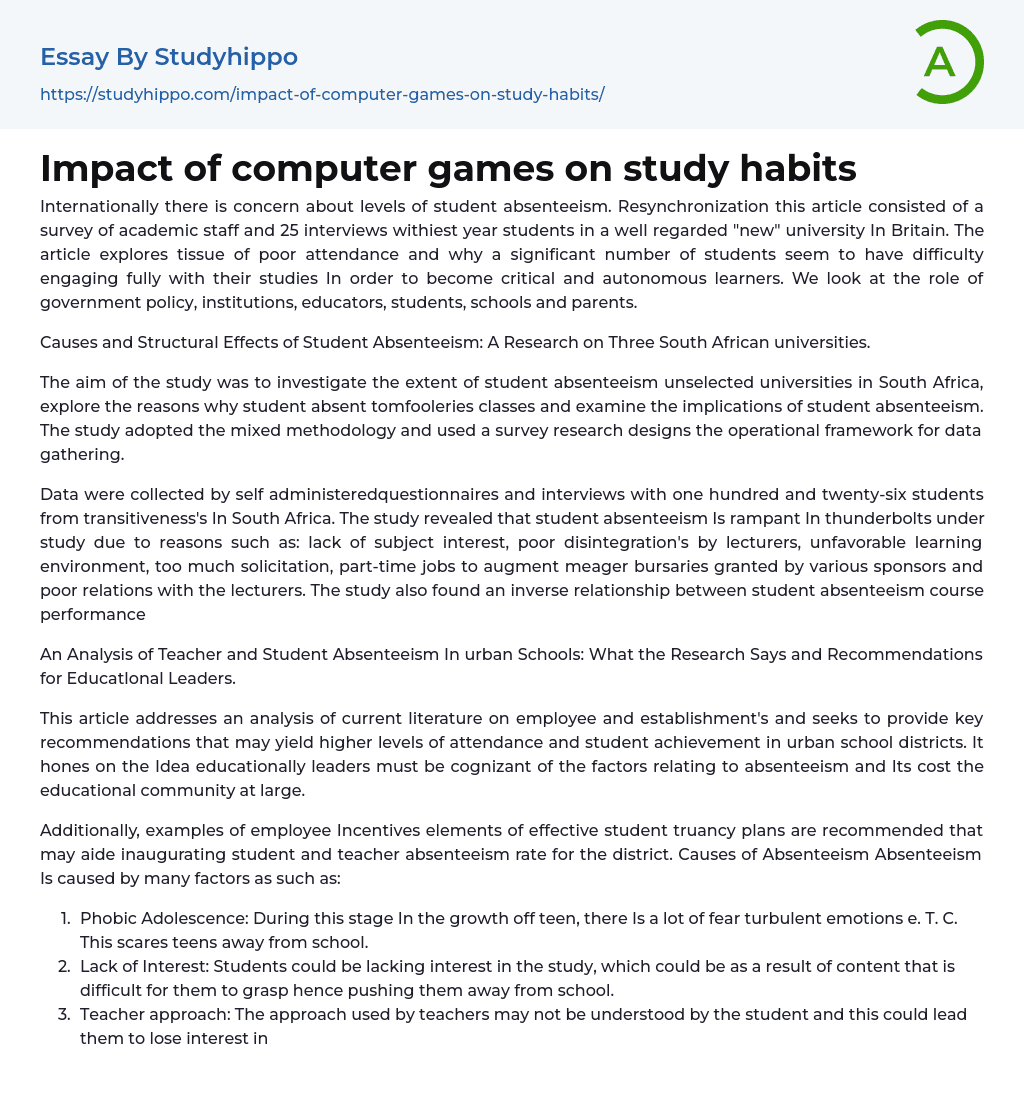The following article discusses the global problem of student absenteeism. It presents findings from a survey conducted among academic staff and interviews with first-year students at a well-regarded "new" university in Britain. The study investigates the reasons behind low attendance rates and the challenges faced by students in actively engaging in their studies to cultivate critical thinking and independent learning skills. Additionally, the article explores the influence of government policies, educational institutions, educators, students, schools, and parents on this issue.
The research focuses on three South African universities and investigates the causes and structural effects of student absenteeism.
The study's objective was to examine student absenteeism in various South African universities. It also aimed to analyze the causes of non-attendance and evaluate its impact. To achieve this, a mixed methodology approach using a survey research design was used for data collec
...tion.
The study conducted at Transitiveness's, a South African university, gathered data through self-administered questionnaires and interviews with 126 students. The findings of the research showed that Thunderbolts students frequently miss classes for various reasons. These reasons include lack of interest in their subjects, ineffective teaching approaches, unfavorable learning environments, excessive academic demands, taking part-time jobs to make up for limited sponsorships, and strained relationships with lecturers. Additionally, the study found a link between student absenteeism and poor academic performance.
An Analysis of Teacher and Student Absenteeism In urban Schools: What the Research Says and Recommendations for Educational Leaders.
In this article, we analyze current literature on employee and establishment's impact on attendance and student achievement in urban school districts. Our goal is to provide key recommendations for education leaders to
address absenteeism and its cost to the educational community.
Furthermore, the text suggests implementing examples of employee incentives to improve student and teacher absenteeism rates within the district. Absenteeism can be caused by various factors.
- Phobic Adolescence: During this stage In the growth off teen, there Is a lot of fear turbulent emotions e. T. C. This scares teens away from school.
- Lack of Interest: Students could be lacking interest in the study, which could be as a result of content that is difficult for them to grasp hence pushing them away from school.
- Teacher approach: The approach used by teachers may not be understood by the student and this could lead them to lose interest in school. Punitive attendance policy plays a big role in absenteeism too.
- Pimpernels from the family: Students who get excessive pocket money from their families are most likely to absent themselves from school since they need time to spend the money.
- Private Couching: Flexible private couching encouraged by some parents could drive a number of students away from the conventional school timetable.
- Diseases: Some diseases like asthma which squires attention and care as well as an environment that is warm and not dusty could make students remain home.
- School Infrastructural Facilities: Lack of libraries, sports facilities is a hindrance to attendance of school among students.
- Entertainment: Accessibility of entertainment facilities like cinemas could divert attention of some students from school.
The consequences of absenteeism include depression, lower educational quality due to missed school time, and
increased likelihood of moral degradation leading to drug abuse, early pregnancies, and unruly behavior.
The definition of absenteeism is the consistent absence from a duty or obligation. In the context of school, absenteeism refers to the regular absence from classes without a valid reason. This truant behavior has a detrimental impact on students' performance. Lat is the habitual failure to appear, particularly for work or other regular duties. A student is an individual who engages in learning and attends an educational institution.
- Computer File essays
- Desktop Computer essays
- Servers essays
- Adolescence essays
- Childhood essays
- Growth Mindset essays
- Individual essays
- Infant essays
- Is Google Making Us Stupid essays
- Camera essays
- Cell Phones essays
- Computer essays
- Ipod essays
- Smartphone essays
- Academia essays
- Academic And Career Goals essays
- Academic Integrity essays
- Brainstorming essays
- Brown V Board of Education essays
- Brown Vs Board Of Education essays
- Coursework essays
- Curriculum essays
- Distance learning essays
- Early Childhood Education essays
- Education System essays
- Educational Goals essays
- First Day of School essays
- Higher Education essays
- Importance Of College Education essays
- Importance of Education essays
- Language Learning essays
- Online Education Vs Traditional Education essays
- Pedagogy essays
- Philosophy of Education essays
- Purpose of Education essays
- Scholarship essays
- Study essays
- Studying Abroad essays
- Studying Business essays
- Technology in Education essays
- The Importance Of Higher Education essays
- Vocabulary essays
- Writing Experience essays
- Classroom essays
- College essays
- E-Learning essays
- Elementary School essays
- Examination essays
- Graduate School essays
- High School essays




